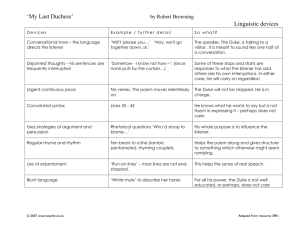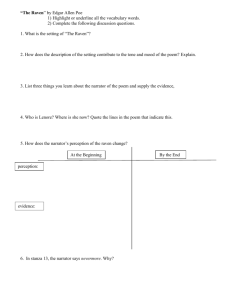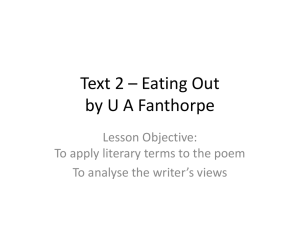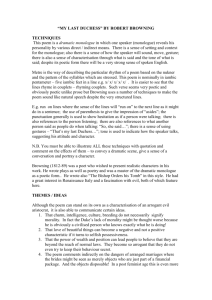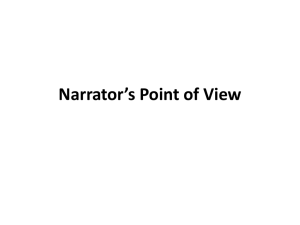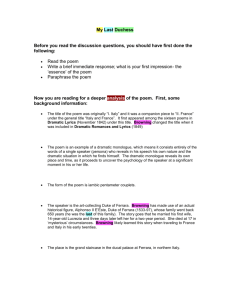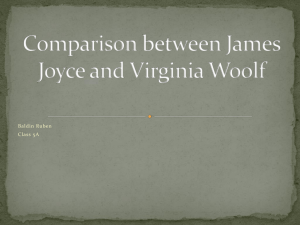USING OBJECTS TO `OBJECT` TO OBJECTIFICATION
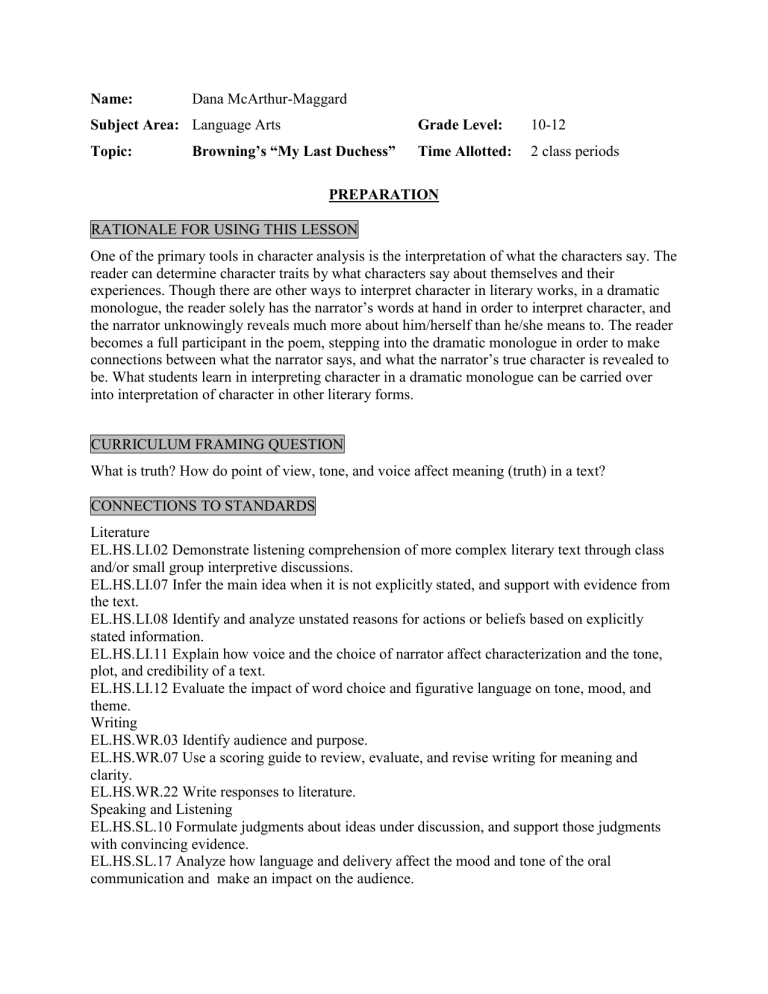
Name: Dana McArthur-Maggard
Subject Area: Language Arts
Topic:
Grade Level: 10-12
Browning’s “My Last Duchess”
Time Allotted: 2 class periods
PREPARATION
RATIONALE FOR USING THIS LESSON
One of the primary tools in character analysis is the interpretation of what the characters say. The reader can determine character traits by what characters say about themselves and their experiences. Though there are other ways to interpret character in literary works, in a dramatic monologue, the reader solely has the narrator’s words at hand in order to interpret character, and the narrator unknowingly reveals much more about him/herself than he/she means to. The reader becomes a full participant in the poem, stepping into the dramatic monologue in order to make connections between what the narrator says, and what the narrator’s true character is revealed to be. What students learn in interpreting character in a dramatic monologue can be carried over into interpretation of character in other literary forms.
CURRICULUM FRAMING QUESTION
What is truth? How do point of view, tone, and voice affect meaning (truth) in a text?
CONNECTIONS TO STANDARDS
Literature
EL.HS.LI.02 Demonstrate listening comprehension of more complex literary text through class and/or small group interpretive discussions.
EL.HS.LI.07 Infer the main idea when it is not explicitly stated, and support with evidence from the text.
EL.HS.LI.08 Identify and analyze unstated reasons for actions or beliefs based on explicitly stated information.
EL.HS.LI.11 Explain how voice and the choice of narrator affect characterization and the tone, plot, and credibility of a text.
EL.HS.LI.12 Evaluate the impact of word choice and figurative language on tone, mood, and theme.
Writing
EL.HS.WR.03 Identify audience and purpose.
EL.HS.WR.07 Use a scoring guide to review, evaluate, and revise writing for meaning and clarity.
EL.HS.WR.22 Write responses to literature.
Speaking and Listening
EL.HS.SL.10 Formulate judgments about ideas under discussion, and support those judgments with convincing evidence.
EL.HS.SL.17 Analyze how language and delivery affect the mood and tone of the oral communication and make an impact on the audience.
McArthur-Maggard 2
PRIOR KNOWLEDGE/BACKGROUND INFORMATION
Students should possess basic knowledge of literary terms (e.g., voice, point of view, narrator, repetition, images, allusion, contrasts, word choice). A chart in the room (made with students prior to this lesson) referencing these literary terms would be beneficial.
Students should have a basic understanding of the significance of characterization in understanding meaning/interpreting literary texts.
Students should have a basic understanding of the definition of a dramatic monologue and how a dramatic monologue is used to interpret character. Discuss each word separately, showing how “dramatic” brings to mind the theater, an audience, characters, and conflict and that “monologue” shows that the poem will be from only one point-ofview and would generally be spoken out loud to an audience. The dramatic monologue is often seen as having three main characteristics: o The reader shares the part of the “listener” or audience. o The speaker uses a case-making, argumentative tone. o The reader completes the dramatic scene from within, by means of inference and imagination. As reader, we participate in the drama by imagining that we are present, and by inferring what the speaker really did. Rarely, however, do we have conclusive proof.
(From Everett, G. (n.d.). Literature . Retrieved November 8, 2009 from http://edsitement.neh.gov
).
LEARNING OBJECTIVES
Content Objectives:
Students will understand the use of the dramatic monologue as a poetic device.
Students will be able to interpret character in a dramatic monologue while providing evidence from the text.
Students will understand the importance of voice, word choice, and point of view in characterization.
Students will learn to read between the lines in a dramatic monologue, becoming an active listener in order to interpret meaning.
Language objectives:
Students will develop a better understanding of how word choice affects meaning.
Students will practice skills in discussion, questioning, and writing.
KEY CONCEPTS
Point of view, choice of narrator, tone, and word choice can affect character.
Point of view, choice of narrator, tone, and word choice can affect the “truth” (or meaning) of a literary text.
KEY QUESTIONS
1.
Who is the narrator?
2.
To whom is the narrator speaking?
3.
What is the purpose of the meeting between the speaker and the listener?
McArthur-Maggard 3
4.
What happened to the last Duchess?
5.
What are some key words? How does Browning’s word choice affect meaning in the poem? What is the impact of the repetition of the words “I,” “my,” and “myself”?
6.
How do you feel about the narrator? What words would you use to describe him?
7.
How do you feel about the Duchess? What words would you use to describe her?
8.
How does choice of narrator affect the story that is told?
9.
What is the reader’s role in “My Last Duchess”? How does the perception of the reader differ from what the narrator is saying?
MATERIALS/RESOURCES NEEDED
Handout of Robert Browning’s “My Last Duchess”
Handout of high order questions for small group activity (one for each student)
White board and white board markers
TECHNOLOGY
Document camera
Computer and overhead to display websites
PROCEDURES
HOOK OR ANTICIPATORY SET
Advance organizer (15 minutes) :
1.
Introduce key concepts by sharing personal narrative about how perception/point of view affects truth/meaning. The personal narrative should be composed of two parts: the first from one point of view; the second, from another point of view.
2.
Ask students why the two stories differ so much from one another. Write their ideas on the board. Ask students how this knowledge affects their understanding of the “truth” of the story.
3.
In their journals, have students write briefly about a situation where their perception of an event/situation differed from someone else, or where two people they know had differing views of a situation. Share their ideas with a partner.
BODY OF LESSON
(Note: Prior to beginning the lesson, write content and language objectives on the board.)
Day One
1.
Write “dramatic monologue” on the board. Ask students what they think a dramatic monologue is. Write ideas on the board. Provide students with definition of a dramatic monologue. (5 minutes)
2.
Hand out a copy of Robert Browning’s “My Last Duchess” to each student. Have students follow along during a monotone reading of the poem. (5 minutes)
McArthur-Maggard 4
3.
Divide students into groups of three. Write three questions on the board and ask students to discuss. Remind students to provide textual evidence (quotes and line numbers) to support their answers (5 minutes) : a.
Who is the narrator? b.
To whom is the narrator speaking? c.
What is the purpose of the meeting between the speaker and the narrator?
4.
Bring the conversation back to a whole class discussion. Write students answers to above questions on board. (5 minutes)
5.
Remind students that, in a dramatic monologue, they are active participants in that they must make connections between what is said and what isn’t said in order to determine the “truth” behind the poem. Divide the class into groups of four (making sure each group is composed of students of mixed abilities). Pass out handout with high order thinking questions. Ask all students to take notes on what is discussed. Move from group to group to facilitate what is discussed. Pass out “Literature Circle” rubric.
(10 minutes)
6.
In their journals, have students write one sentence about something they feel they understand about the poem, and one thing they want to understand better about the poem. (5 minutes)
7.
Homework: Students should reread the poem at home and think about the discussion questions in order to be able to participate more fully in the next day’s discussion group.
Day Two
1.
Keep the students in their original groups. Students review questions discussed and continue discussing questions from previous day. Move from group to group to facilitate the discussions. (15 minutes)
2.
Bring the conversation back to a whole class discussion. Have students share what they talked about within their groups. Write key ideas on board, focusing most heavily on interpretation of the Duke’s character and how it is supported by the poem.
(10 minutes)
3.
With what they now know about the poem, ask students to think back to the monotone reading given at the beginning of the lesson. Ask them to think about how they would
“perform” the reading of the poem. Practice with a partner, trying to bring the Duke’s voice to life. Ask for volunteers to read either part or all of the poem, taking on the personae of the
Duke. Have the “audience” state whether the reading matches their vision of the Duke. How does changing the tone affect how we interpret the Duke’s actions/intentions? (10-15 minutes)
4.
Tie the lesson back to the learning objectives by asking students to write in their journals from the point of view of one of the following characters in “My Last Duchess”: a.
The Duchess b.
The Count’s envoy c.
Fra Pandolph
The students should describe events from the point of view of the character chosen. Their understanding of the events and characters should be evident in what they write, and the voice of the character should come through as well, giving that character’s unique perspective. Ask for volunteers to share with class. (15 minutes) .
5. Homework activity: Have each student write a brief character analysis of the Duke. Provide students with the character analysis rubric which will be used throughout the unit.
McArthur-Maggard 5
EXTENSIONS/DIFFERENTIATIONS
For low level and ELL students, match them with a higher level learner when forming pairs, and place them selectively within groups for further discussion.
For low level and ELL students, provide a graphic organizer during character analysis to help them follow basic steps of interpreting character (make handout available to all students as well).
For the homework for Day Two, permit students to pursue the activity further, creating their own dramatic monologue from the point of view of another character within the poem.
For high level learners, encourage them to seek out other dramatic monologues and have them journal about what they read and thought about the poems.
ASSESSMENT
EVALUATION OF STUDENT LEARNING
Make note of student participation during pair work, small group discussions, and class discussions.
Assess findings of each group while monitoring their discussions. Have students turn in their notes from the group discussions to demonstrate their understanding of the poem.
Assess students journal writing and homework projects in relationship to how the projects reflect their understanding of the poem’s meaning and how choice of narrator, point of view, voice, tone, and word choice affect that meaning.
REFLECTION
What worked well?
What would you do differently?
Did students’ reactions to the poem surprise you in any way?
Lesson adapted from
“Browning’s ‘My Last Duchess’ and Dramatic Monologue.” (n.d.). Retrieved November 8, 2009 from http://edsitement.neh.gov
.
Name________________________________________________
“My Last Duchess” Discussion Questions
In your group, answer the following questions. Make sure to note textual evidence and reference line numbers.
Each student should take notes during the discussion to use during class discussion and to hand in at the end of class.
1.
What happened to the last Duchess?
2.
What are some key words? How does the poet’s word choice affect meaning in the poem? What is the impact of the repetition of the words “I,” “my,” and “myself”?
3.
How do you feel about the narrator? What words would you use to describe him?
“My Last Duchess” Discussion Questions, page 2
4.
How do you feel about the Duchess? What words would you use to describe her?
5.
What is the reader’s role in “My Last Duchess”? How does the perception of the reader differ from what the narrator is saying?
6.
How does the choice of narrator affect the story that is told? How would the story differ if another character told it (choose one: the Duchess, Fra Pandolph, the envoy)?
